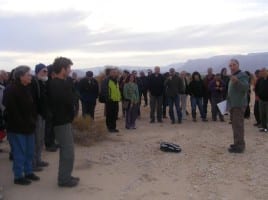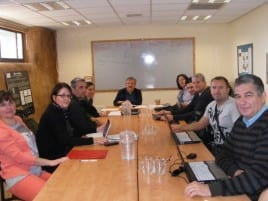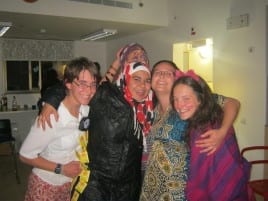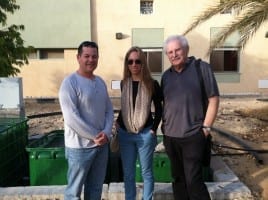I would like to begin my post by thanking all of the students, staff, and faculty that made the 2013 fall semester a wonderful learning experience for everyone. Looking forward to the 2014 spring and fall semesters, there are many new and exciting developments to report.
Student recruitment is on the rise. For the fall 2014 semester, we have set a goal of 50 students and 15 interns, which would fill up both the new Acacia dorms (the JNF dorms) and the older Argania dorms.
These students’ academic experiences will be enhanced by the numerous faculty and research advancements currently underway at the Institute. We are proud to introduce the Bley Stein Visiting Professorship program, which will enable the Arava Institute to annually host a leading academic in one of the fields of study at the Arava Institute. With the support of a major JNF donor, the Arava Institute hopes to further enhance the Research and Visitors Park and to find a new director for the Center for Renewable Energy and Energy Conservation. The Center for Trans-boundary Water Management, led by Dr. Clive Lipchin and assisted by Dr. Shlomo Kimchi, will complete the instillation of off-the-grid greywater treatment and reuse systems in Israel, Palestine and Jordan. The next step will be to install gravitational drip irrigation systems, developed by Netafim, Israel’s leading irrigation company, which will enable agriculture in areas that lack electricity and infrastructure such as the Bedouin communities and Negev villages. In addition, the Center will be setting up monitoring and water analysis stations along the Besor River as a pilot for cross border cooperation on river clean up and restoration programs between Israel and Palestine. The Arava Center for Sustainable Development, directed by Dr. Shmuel Brenner, which is devoted to research, training and extension services in the developing world, is planning on implementing a first ever training program at the Arava Institute to prepare volunteers to work abroad in programs like Furrows in the Desert (see the article below) and other volunteer programs in the developing world. The first participants in this program will be our own Arava Institute Spring Semester students.
Arava Institute alumni will also benefit from changes in the coming year. Thanks to a generous donation from a 2013 Israel Ride Alum, the Arava Institute will be able to hire a new Alumni Coordinator and to increase the attendance of the spring Alumni Conference by 50%; enabling 150 participants to join the annual event. We will also see the convening of the second annual North American Arava Alumni Network in DC in parallel to the annual Friends of Arava board meeting and the first annual European Arava Alumni Conference in London this summer. The United Kingdom will also be host to new fundraising efforts, including an event at the House of Lords. Other development undertakings include three events held by the Public Council for the Arava Institute in Israel. The Public Council, chaired by Ambassador Daniel Shek, is looking to double its membership this year from 30 to 60 members and will implement the second Public Council Trip to Jordan and West Bank Palestine.
Finally, the Israel Ride appears to be on track to exceed our recruitment goal of 170 riders this year, with already 120 riders signed up for the November 2014 ride. Spaces are limited so sign-up today! David Lehrer
Yotvata salt flat seminar

On January 14, the Fall semester Final Party, themed Arava in Wonderland, marked the end of the semester. The event took place in the brightly decorated student lounge where students arrived dressed as characters such as the Caterpillar, Alice, and Lewis Carroll. The evening began with games and laughter then moved on to the award ceremony where each student received their formal certificate of completion of a semester at the Arava Institute. In addition, the Campus Life Team presented their own humerous awards. The night ended in dancing as cheerful students and staff celebrated the end of a terrific semester. Submitted by Aviva Gottesman
Furrows in the Desert and Brit Olam Visit the Arava Institute
On January 21, the Arava Center for Sustainable Development, ACSD, Furrows in the Desert (FID), Amit Eliyahu and representatives from Brit Olam, the institute’s partner in the project in Africa, met to discuss the ongoing projects in Turkana, Kenya. FID teaches farmers in Turkana, Kenya how to be more sustainable. The training projects include land preparation, solar water pump technology, gravity fed irrigation system, as well as the basics of how to grow and harvest crops. While stationed in Turkana year round, the FID farm manager and volunteers continue to support the training of the farmers as they graduate from the FID training program and successfully establish their own farms in Kenya. Submitted by Amit Eliyahu and Yelena Galperina
Workshop on Sustainable Agriculture in Desert Regions

Arava Institute Visiting Professor Profile: Thomas Henry Culhane




